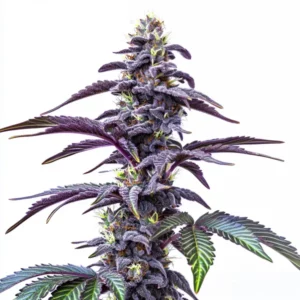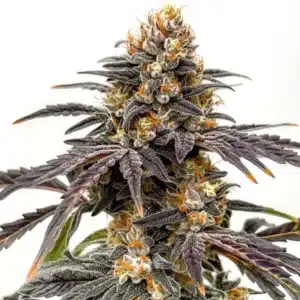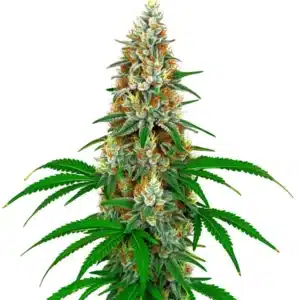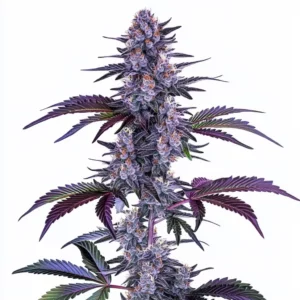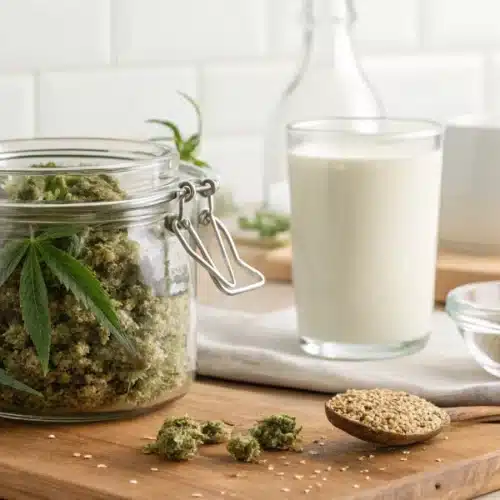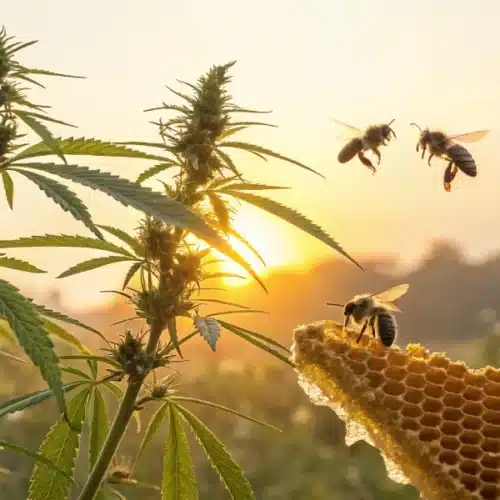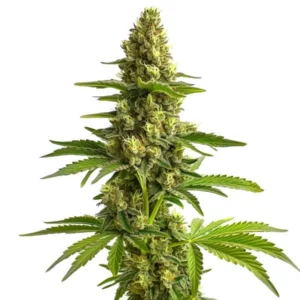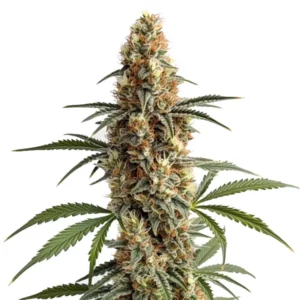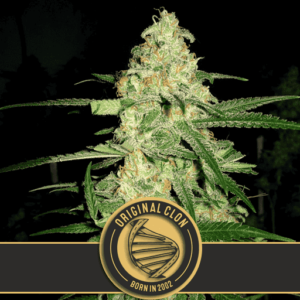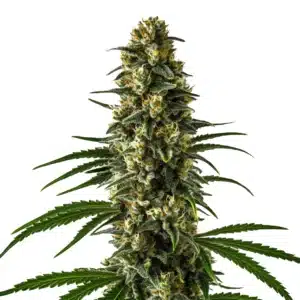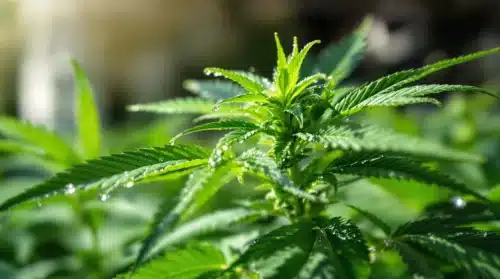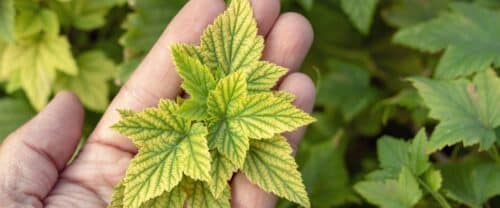In this article, we are going to tell you why Nitrogen is so important for marijuana plants, how it influences their development during growth, and why a plant lacking nitrogen will be affected during flowering. In the first place, it is good to point out that plants extract proteins from nitrogen that help them produce chlorophyll as well as obtain vitamins and stimulate their hormones. Secondly, we say that nitrogen is involved in all enzymatic reactions and plays an active role in plant metabolism.
Through the study of the cannabis plant, it has been shown that plants with high nitrogen content in their leaves contain more THC. This is evident in many strains, such as Bruce Banner x White Russian, which demonstrate significant potency when grown with the right nutrient levels. When a cannabis plant is cultivated with the necessary doses of nitrogen, it grows better, it develops larger leaves and a greater number of branches, and the vegetative period is prolonged, becoming more vigorous.
This macronutrient called (N) is considered one of the “primary” nutrients for cannabis because this plant requires it in abundant quantities throughout its life, especially during the vegetative phase. There is a trio of essential nutrients made up of nitrogen (N), phosphorus (P), and potassium (K). Furthermore, nitrogen is a mobile nutrient, meaning that the cannabis plant can extract it from older leaves and direct it towards younger leaves if there is a shortage. For this reason, symptoms of nitrogen deficiency cannabis usually appear first on the oldest leaves at the bottom of the plant.
A good substrate for growing cannabis will always contain enough nitrogen, but the plant may not be able to absorb it properly in the first instance which is why microorganisms are highly relevant because they are the ones that can move that (N) volatile towards the roots so that it is distributed throughout the plant. Black Domina x Scott’s OG, for example, thrives in a nutrient-rich substrate with proper nitrogen management.
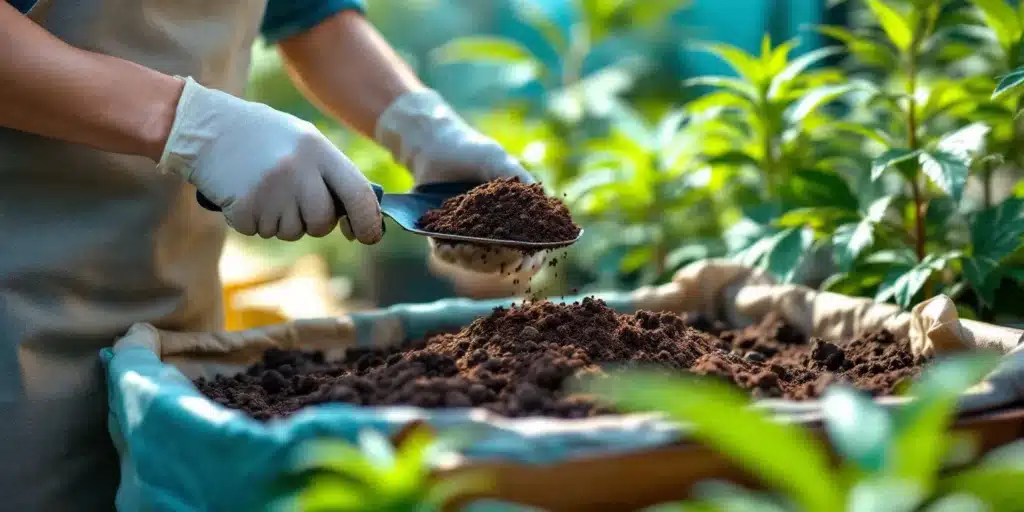
Causes of Cannabis nitrogen deficiency
Cannabis needs nitrogen throughout its life cycle, although it requires much higher amounts during the vegetative phase. Therefore, fertilizers for the vegetative phase usually contain more nitrogen than fertilizers for flowering. This element is necessary for plants to produce chlorophyll, proteins, amino acids, and other important biological compounds. This is especially important so that marijuana can develop its stems, leaves, and branches. If the plants do not have enough nitrogen, they will suffer from growth problems and may even die.
Now we are going to analyze the main causes for which there may be a Nitrogen deficiency in cannabis plants and that can also be applied to other types of plants.
1- Incorrect PH: The PH must be balanced because if a marijuana plant is exposed to a very low or very high PH, it will be blocked and will not consume the nutrients it requires for its development.
2-Temperature: Measuring parameters like temperature is important when growing weed. This is because if the plants have very low or very high temperatures, they can be blocked and will not consume the nutrients they require properly, generating a deficiency.
3- Nitrogen shortages: As we know, plants obtain nutrients from the soil, from the fertilizers with which they are irrigated, and from any nutritional source they have. However, if these sources are poor in nutrients, weed plants will be faced with a deficiency which makes it impossible for them to develop optimally.
4- Natural depletion of the soil: It is natural for the soil to lose nutrients. The same can happen with the substrate in which marijuana is grown, hence the importance of changing the substrate in each crop. Therefore, it is always good to promote the nutrition of the soil in the event that it is cultivated in mother earth or the use of a new substrate that is rich in nutrients in the event that a substrate that is sold in the market is used.
5- Excess of some minerals: Excess manganese, chloride, potassium, or zinc can prevent your cannabis plants from absorbing nitrogen in the amounts they need.
6- Damaged roots: Damaged roots: A nitrogen deficiency can be promoted if the plants have a damaged root system because they are not able to capture the nutrients they require. Therefore, from the beginning of the crop, a fundamental job is to promote the growth of a strong and healthy root system. Strains like Black Demon OG are known to thrive with a well-nourished root system.
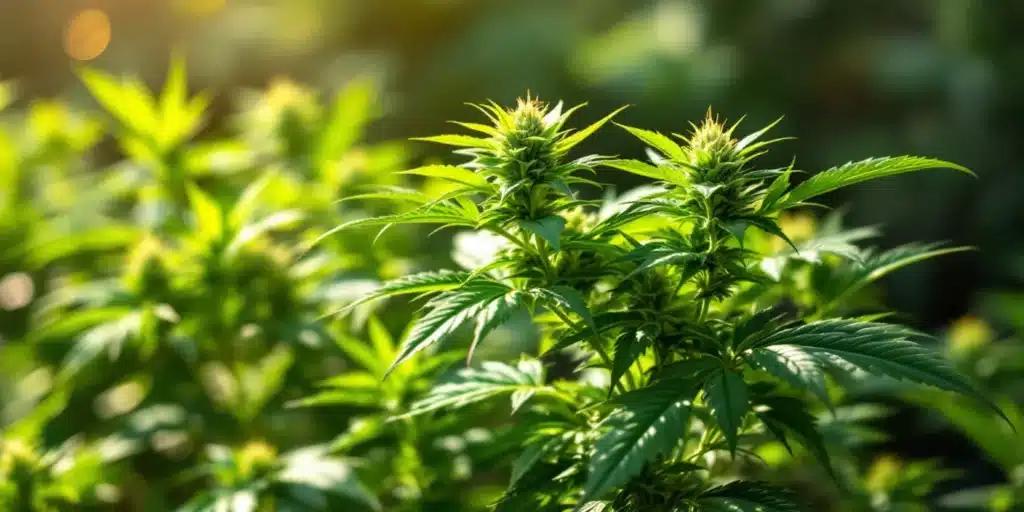
Promos & Deals
Cannabis new growth deficiency
In a new cannabis crop, there may be nitrogen deficiencies because the plant does not receive the nutrients it requires or because it may be blocked from consuming the available nitrogen or for other reasons. From this point, we tell you that marijuana does not need fertilizers during the first 2-3 weeks of growth. Therefore, it is not recommended to fertilize them because this helps the development of the roots which we talked about in the previous point and, on the other hand, contributes to the general health of the plant.
It is recommended to start fertilizing when the plants have reached a height of 15-20 cm or from week 4 of life, but only using 25% to 50% of the dose of fertilizer suggested in the product you are using. Everything changes in week 4 when the plants have entered the vegetative phase because they will need large amounts of nitrogen, along with other essential nutrients. Strains like Badazz Cheese tend to benefit from a well-measured nitrogen boost during this phase.
It is important to apply the doses recommended by the manufacturer of the fertilizers you are using. Despite this, keep in mind that the nutrients required by the plant can fluctuate depending on the type of cannabis plant you grow, its genetics, and obviously the conditions you grow. Thus, an autoflowering marijuana plant will need less nitrogen than a feminized or regular plant, so you must be careful not to overdo and over fertilize weed plants when you feed them.
Nitrogen deficiency during flowering
It all starts with pre-flowering which is generated 2 weeks before the effective flowering of the plants begins. When cannabis plants have effectively defined their flowering, they will experience vigorous vegetative growth, stretching considerably. Some plants get to double or triple their current height and others tend to widen their size towards the side. Strains like Amnesia Purple are known to experience significant growth during pre-flowering, requiring careful nitrogen management.
So, in order to support this flowering growth, the cannabis plant will need more nutrients, especially nitrogen. Fertilization programs for commercial cannabis fertilizers usually take this into account. It is good to maintain nutrition with nutrient-rich fertilizers and their respective amounts for at least 1 or 2 weeks after pre-flowering, in order to prevent the vegetative growth of your plants from stopping completely.
From this point on, when the plant has officially entered flowering, it will stop producing branches and leaves and focus on the formation of the beloved buds. It is in this phase that they will need less nitrogen and higher amounts of phosphorus and potassium.
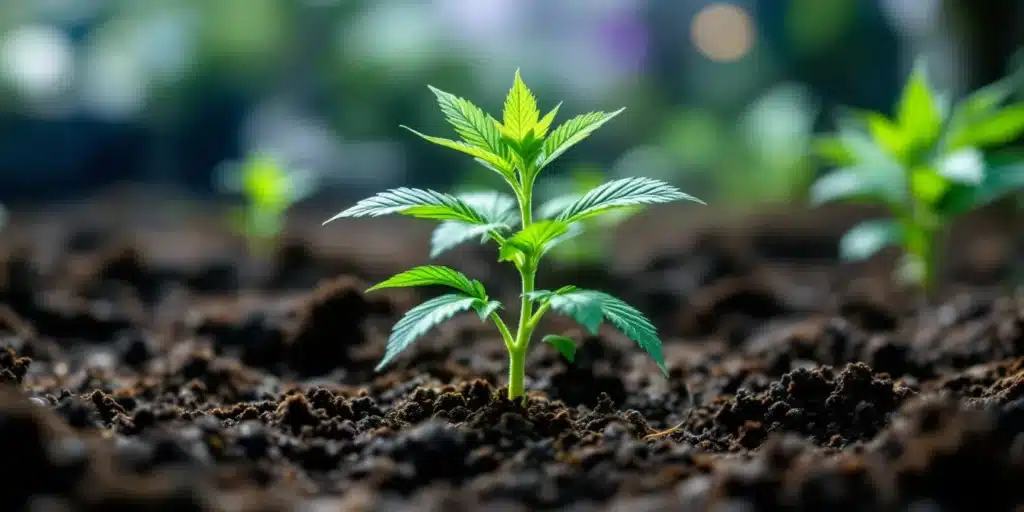
How To control nitrogen deficiency in cannabis plants
To solve this deficiency problem, it is best to use water-soluble nitrogen. You can use the commercial products that are sold in grow shops. After the fertilization process, nitrogen-deficient cannabis plants will absorb as much nitrogen as possible and after a few days, the plants will return to their bright green color.
There are different mixtures of premixed nutrients in the products that they sell in the grow shops that will help you combat the deficiency in your marijuana crop. If you like to experiment, you can use nitrate of soda or organic fertilizer that you can even do in home and are excellent for delivering nitrogen to your plants.
Organic nitrogen fertilizer
Also, there are organic methods such as fertilizers that you can make at home and that are rich in nitrogen. Here, we are going to tell you about some formulas that are used by breeders who love organic cannabis cultivation. We are going to show you two homemade fertilizers that are rich in nitrogen and are easy to make to give your weed plants the best nutrition.
A- Many breeders use coffee as a natural fertilizer because coffee grounds are acidic and favor the development of acetic acid bacteria in the substrate. They contain around 2% nitrogen and other organic nutrients. The best way to prepare a good fertilizer for marijuana is to add the coffee grounds to the compost you prepare at home or to your composter or mix it with the substrate at a ratio of approximately 2 grams of coffee grounds per liter of soil.
You must be careful because you have to control the pH well or they can leave the substrate too acidic. Try to keep the PH between 6 and 6.5 so that there are no problems. If you mix the coffee grounds with other homemade fertilizers, try not to exceed 20% so as not to decompensate the substrate or leave it with an excess of fertilizers that can harm your plants.
In the case of growers who want the plants to be able to absorb nutrients more quickly, they can dilute the coffee grounds in a liter of water and let the mixture stand for 24 hours. After this time has passed, we already have a good dose of fertilizer for our cannabis plant.
Some gardeners wait up to 48 or even 72 hours to use this organic fertilizer in liquid format. In this case, we do not use the grounds directly as fertilizer but rather the mother liquor derived from the digestion of the grounds, the same way as industrial fertilizers that are sold in grow shops are used.
B- Lentils and grains such as beans are rich in auxins which represent a very important group of phytohormones that regulate plant growth and phototropism, causing branches to grow vertically by elongating plant cells. Auxins have traditionally been used in gel form for root development in cuttings and seedlings and can be found in other ecological media such as seaweed and teas made from auxin-rich seeds as occurs with certain species of legumes.
This is undoubtedly one of the most traditional and popular nitrogen-rich fertilizers that you can prepare at home. You only need 100 grams of lentils or beans, 2 pots, 2 cloths, water, and 1 strainer and the preparation is very simple.
Here, we share the 5 steps to making the best lentil tea in the galaxy.
1-Put 100 grams of lentils in a pot, add 1 liter of water, and let stand for 4 hours. Later, we place the strainer over the pot and pass the water without the lentils and cover each pot with a cloth.
2- After 24 hours, we remove the cloths and mix the water with the lentils again, wait 15 minutes and filter the water from the lentils again.
3- We repeat the previous step and 1 day later, we mix the water with the lentils for another 15 minutes, and continue doing this until the lentils germinate and their roots are at least 1 cm.
4- When the lentils are germinated and rooted, you have to crush the lentils and leave them mixed with the water for at least 1 hour so that they release all the hormones.
5- We filter the water for the last time and now we have our special stimulator for the rooting phase. It is homemade, rich in nitrogen, and cheap. You can use it directly in irrigation and remember to store what is leftover in a cool, dry, and dark place for up to 3 months. You can also mix it with the compost or homemade substrate that you have.
Now, all you have to do is get to work and with these tips, you will have great results in your crops and avoid a nitrogen deficiency or an excess of the same nutrient. Keep exploring and learning in our blog that awaits you with the best cultivation tips. See you on the next blog!

